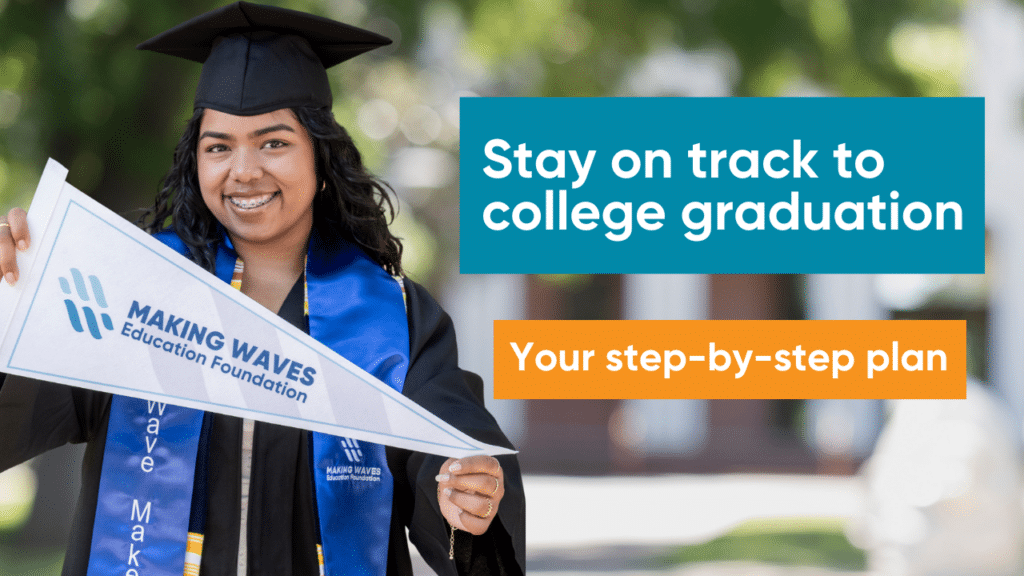
YES! It’s OK to Change Your Major
by Avery Tomlin
As a first-gen student from Silicon Valley, I grew up with a dream that wasn’t necessarily mine. With my parents and own future in mind, computer science and programming felt like the only option I had to make money and avoid the struggles that I saw my parents go through. Computer science was going to be that entry to the life I wanted for my family and me.
However, now that I am a college graduate, I am here to tell you that that is not true.
When applying to college, many of us apply with the mindset of choosing a major that will allow us to be the most successful, monetarily, post-college. However, sometimes this mindset isn’t based on what we really want to do. Through my college experience I realized that happiness and enjoyment in what you do is the most important and money will follow. If you can put passion into your work, it will speak for itself!
After switching from being a computer science major to a design major at UC Davis, I am sharing some of my experiences and tips on how to choose the best major for you. I hope this helps students who feel like they are majoring in something for all the wrong reasons.
1. It’s OK to switch your major
My first tip is being ok with switching your college major! Switching your major can come with the feelings of disappointment and failure, however, as an undergraduate student, you realize how normal switching your major is. Although switching your major can have a negative connotation, there are many positives to switching it!
Having switched my major once, I know how much of a breath of fresh air it can be and it allowed me to flourish in my undergraduate career. Instead of looking at it as something you shouldn’t do, one thing that really helped me when switching my major was to think of it as finding something that better suited my interests and my talents! With that mindset, you’re on your way to choosing that major for you!
2. Take a variety of classes
My second tip in choosing a college major for you is to take a variety of classes. It is important to take different classes because it allows you to get a sense of what different majors and professions feel like without committing to a major. With general education, or GE, requirements being the major goal of your first two years in college, you can take fun and exciting classes that you normally wouldn’t in your later years due to your focus in your major.
In my first two years I took classes in calculus, programming, musics of the world, humanities, and space geology – just to name a few. This variety is important because you learn very quickly what you like and what you don’t like. I decided I did not like classes that involved science and math and leaned towards classes that focused on the arts. This exploration helped me to switch my major from computer science to design.
3. Trust your gut
My third tip in choosing a college major for you is to trust your gut! You know yourself best! In my situation, my parents, family members, friends, etc. all gave their input when I told them I wanted to switch my major from computer science to design.
I was told that “it’s only been a quarter, how do you know you dislike computer science?” or “design isn’t going to make you as much money as computer science.” Comments like these can be discouraging. You can feel stuck, confused, and left wondering which decision is best for your future. It can feel like this decision is going to alter your future in a negative way, but, in the end, you must make this decision for yourself.
At the end of my first quarter at UC Davis, I realized that computer science was not fun for me. I did not like doing calculus and I did not like using programming to solve math problems. I knew that if I was doing programming every day as my profession, I was not going to be happy, regardless of the money. It was up to me to take control of my future and switch my major to something that was going to be fulfilling and give me motivation to be creative, and design was just that! If I didn’t trust my gut, I would not be the creative person I am today.
Trust your gut because you never know what that decision can do for YOU and YOUR life!
4. Do research
My final tip in choosing a college major for you is to do some research. If you’re reading this and thinking, “well yes, it is nice to do what I want but it’s not going to support my livelihood,” do a deep dive into other professions and majors that align more closely with your passions. If you choose an initial major because it’s going to make you money, it is going to be harder to fall in love with what you do.
Make time for research and you’ll find things that not only pay well (if you’re worried about money) but also align with your passions.
Although certain professions are not as lucrative as computer science, if you can fully put yourself into something you enjoy, your work will speak for itself, and the money will follow. Your passion will show in your work and that is how opportunities and money come. Drive, passion, talent, and fulfillment are much more important than how much money you’re making!
Avery Tomlin is a UC Davis graduate with his BA in design. He is an alum of Making Waves’ college and career success program and served as a Marketing and Storytelling Intern with Making Waves. His future goals lie in fashion and he looks forward to becoming a stylist and creative director while working closely with haute couture.
ABOUT MAKING WAVES Education FOUNDATION
At Making Waves, we are committed to educational equity. Making Waves Education Foundation is a Bay Area nonprofit that supports Making Waves Academy – a public charter school with more than 1,100 5th through 12th grade students – and leads college and career programming with more than 430 college students.
Knowing the opportunities that come with a college degree, we partner with historically underrepresented and underserved students to help make college affordable and graduation attainable. Centering the journeys of our students, our personalized approach includes college and career coaching, scholarships, and financial planning.
Our alumni network includes more than 730 college graduates, who earn their degrees and land jobs at more than twice the rate of their first-generation, low-income peers, with 85% graduating debt-free.
Related News and Resources
YES! It’s OK to Change Your Major
October 23, 2024
Seven steps you can take now to land the internship
October 1, 2024
Five steps to stay on track to college graduation
October 1, 2024




